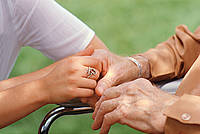Directly involving the thousands of family members and friends who serve as ‘informal carers’ for people with dementia in the evaluation of patients’ symptoms and behaviour could offer improved insights for healthcare professionals and help alleviate feelings of stress, guilt and isolation felt by many who fulfil these duties, a new study published in Dementia has found.
The findings highlight a need for more structured educational programmes covering broader knowledge around the disease for informal carers, who often have no formal training or support networks to depend on. Information on disease progression, guidelines on dealing with challenging behaviours and financial and legal advice could better prepare carers about what to expect.
The research, conducted by an inter-disciplinary team of experts, collated insights from carers and health care professionals and identified key themes which capture the main challenges faced by carers, as well as the type of support they want from health care services.
Previous research found that informal caregivers of people with dementia often display increased levels of depression and stress as well as poor self-rated health.
The new findings show that existing health and social care services are often fragmented which can make communication between healthcare professionals and care providers difficult. Healthcare professionals also stated that while they have a theoretical knowledge of the disease, they felt they often lack knowledge of how it is to live with dementia which can make it difficult to know how best to support caregivers.
The researchers say they hope that the findings will lead to improvements in dementia care with a goal of creating a better educational package for carers.
Paper: “Caregivers’ interactions with health care services – Mediator of stress or added strain? Experiences and perceptions of informal caregivers of people with dementia – A qualitative study”
Reprinted from materials provided by the University of Lincoln.

